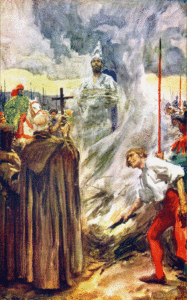Specifically, members of Congress who think they’re Christians.
Immediately, eyes roll, and people look the other way. Christians in Congress? Congress a Christian institution? Gotta be kidding! Congress is a mosh pit.
So, Noah Berlatsky, the Jewish atheist, is a freelance writer trying to slog his way to fame, honors, and prosperity by having opinions about lots of things (photo and semi-bio here), including this, which NBC News published here.
He begins his essay with Marjorie Taylor Greene, who is not a Christian, and Debbie Dingell, who also sometimes goes to church, yelling at each other on the Capitol steps about who’s more Christian, excuse me, who’s less Christian, which strikes me as un-Christian (what happened to forgiveness, and praying for those who would spite you)?
 Look, first of all, a lot of people calling themselves “Christian” aren’t, and a lot of things wearing a “Christianity” label are actually profit-seeking businesses (e.g., megachurch pastors, and trafficking in stolen artifacts). But I digress. That’s my opinion, and this article is about Berlatsky’s opinon.
Look, first of all, a lot of people calling themselves “Christian” aren’t, and a lot of things wearing a “Christianity” label are actually profit-seeking businesses (e.g., megachurch pastors, and trafficking in stolen artifacts). But I digress. That’s my opinion, and this article is about Berlatsky’s opinon.
Berlatsky claims “Christianity remains a moral bedrock of political dispute” — and says “that’s a bad thing.” If I can interject again, to clarify, I think he means CINO (Christian-in-name-only) is put into service as a bedrock of moral arguments for political positions; and, viewed in that light, why it’s bad doesn’t need explaining.
The shouting match (un-Christian — ed.) between Greene and Dingell on the Capitol steps was about abortion. The Democrat-controlled House had just passed an abortion rights bill, which has no chance of passing the Senate, and Greene “began to yell somewhat incoherently” (un-Christian — ed.) at a group of the bill’s supporters, which included Dingell, who yelled back (un-Christian — ed.) that Greene was being uncivil (i.e., un-Christian — ed.), which she was.
“’You should practice the basic thing you’re taught in church: respect your neighbor,’ Dingell shouted. Greene blasted back, ‘Taught in church, are you kidding me? Try being a Christian and supporting life!’ Dingell responded, ‘You try being a Christian and try treating your colleagues decently!’”
As you would expect, it went downhill from there.
Berlatsky continues, “Dingell thinks being a Christian means being neighborly and civil.” (That isn’t the half of it — ed.) “Greene thinks being a Christian means attacking anyone who supports abortion rights.” (No, it doesn’t — ed.) “But they both agree that being a Christian is morally good, and that Christianity is virtuous.” (True; but the hard part is being morally good and virtuous, and most people are no good at it — ed.)
“For a Jewish atheist like myself, that framework is wearisomely familiar,” he says. Oy. “Just to take one example: Jewish people’s experience of Christian morality has not been universally uplifting, to say the least.” He mentions Christian nationalism, antisemitism, and “a couple thousand years of persecution and hate.” (To clarify the record, Hitler was pagan, not Christian; but he didn’t refer specifically to him, and makes clear it didn’t start with him.)
His larger argument appears to be, “And if Christianity equals virtue, where does that leave Jewish people — or Muslims, or atheists, or Buddhists, for that matter?” This, of course, implies that people who consider themselves “Christians” think they have a monopoly on virtue.
 He points out there are “good Christians, as there are good people of every faith, and of no faith.” The Taliban don’t believe this, nor did the Catholics who burned Protestants at the stake, and neither did Protestants who hanged witches, nor did any of the perpetrators of history’s countless religious wars. As he points out, “one of the hallmarks of immoral forms of Christianity is a belief that Christianity can only be good — and that the good can only be Christian,” which is more or less the distorted thinking underlying these activities.
He points out there are “good Christians, as there are good people of every faith, and of no faith.” The Taliban don’t believe this, nor did the Catholics who burned Protestants at the stake, and neither did Protestants who hanged witches, nor did any of the perpetrators of history’s countless religious wars. As he points out, “one of the hallmarks of immoral forms of Christianity is a belief that Christianity can only be good — and that the good can only be Christian,” which is more or less the distorted thinking underlying these activities.
“This is the logic of Marjorie Taylor Greene and the rabidly Trumpist politics she represents,” Berlatsky says. “Sociologist Philip Gorski argued in a 2019 article that evangelical white Christians loved Trump not despite his violent and scabrous language, but precisely because he told them they were better than everyone else. Evangelicals, Gorski said, responded to ‘Trump’s racialized, apocalyptic, and blood-drenched rhetoric.'” (Un-Christian –ed.) “That rhetoric harkened back to the Christian language deployed to justify slavery and Native American genocide.” (Un-Christian — ed.) “Trump told white evangelical Christians that they had a right and a duty to impose their morality, through force, on others.” (Un-Christian — ed.)
(Look, I’m no authority on Christianity. I didn’t graduate from divinity school. I’m not a religious scholar. But I know un-Christian behavior when I see it, which is why all these insertions — Ed.)
Where is Berlatsky going with this? Well, basically he’s complaining about “Christian supremacy” and its practitioners’ refusal or failure to acknowledge “non-Christians in discussions of America, and in discussions of goodness” (which, of course, is un-Christian — ed.).
On this, he says,
“Marjorie Taylor Greene is, unfortunately, still a Christian when she spews ugly antisemitic conspiracy theories about Jewish space lasers. She’s still a Christian when she attacks her colleagues. She’s still a Christian when she tries to force people to give birth because of her own particular convictions about souls and cell clusters. But being a Christian doesn’t make you a good person, just as being a good person doesn’t make you a Christian. When we, including Dingell, accept that, maybe we’ll be closer to defeating the evil, violent and Christian movement of which Greene is a part.”
 I disagree. Calling yourself a Christian doesn’t make you one, and Greene is no Christian. I’ll keep an open mind about Dingell for now, but anyone who tries to persuade me that Congress is an institution that promotes Christian values … don’t make me laugh.
I disagree. Calling yourself a Christian doesn’t make you one, and Greene is no Christian. I’ll keep an open mind about Dingell for now, but anyone who tries to persuade me that Congress is an institution that promotes Christian values … don’t make me laugh.
I’m not saying there’s no real Christianity or Christian morality in our country; there is. For example, church-run food banks. And pretty much wherever you see tolerance and forgiveness. It mostly exists quietly, in little ways, all over the place. Add them all up, and it makes a big difference.
But, most of all, real Christianity doesn’t exclude acts of charity and decency by other people, or propelled by other motivations. This world is in so much need of charity and decency, there’s room for all of it, wherever it comes from. That’s my opinion, not Berlatsky’s. I think his grievances are too specific, whereas my view of the situation — and the state of humanity — tends to be more non-specific.